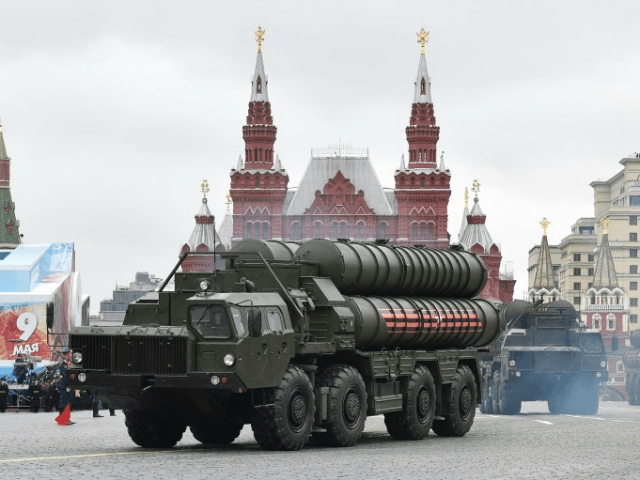The government of Turkey confirmed this week that it had signed a deal to purchase a Russian S-400 missile system, alarming other fellow NATO members who discourage such military deals with Moscow.
In confirming that Ankara had made a “deposit” on the purchase, President Recep Tayyip Erdogan appeared to mock Western nations who expressed concern with the deal, joking that “they went crazy” over Russia taking yet another step towards bringing Turkey into its orbit.
“Our friends have already signed [an agreement on] S-400s. A deposit has also been paid, as far as I know. The process will continue by the transfer of a credit from Russia to us. Both Mr. [Russian President Vladimir] Putin and myself, we are determined on this issue,” Erdoğan told reporters on Monday while flying back from Kazakhstan, where he had attended a summit of the Organization of Islamic Cooperation (OIC).
“It’s us who will make decisions regarding our independence,” Erdogan insisted, according to Turkish newspaper Hurriyet. “We are responsible over taking security measures for the defense of our country. We’ll save ourselves if we face difficulties in procuring defense systems.”
Anadolu Agency, Turkey’s state-run news service, reported that Erdogan remarked in a meeting in Ankara Wednesday that NATO allies “went crazy just because we made the S-400 deal.” He added that Turkey chose the Russian deal because it felt an urgent need to purchase more missiles but could not find a better agreement with any other party.
“What were we supposed to do? Wait for you?” he asked, apparently of NATO member states. “We are taking care of ourselves. We are taking security measures and will continue to do so.”
Hurriyet further adds that Erdogan insulted America and Israel in particular. “America and Israel were always very reluctant to give their unmanned air vehicle products. And when they did give them, their repair and maintenance put us in a difficult position,” he explained. “Now, Turkey can produce its own UAVs, even armed ones. And they are disturbed by that fact. We will do better things. We are taking important steps.”
The passage of the S-400 deal was not a surprise, as Turkish and Russian officials had discussed such an agreement in July. This week brought the first confirmation that Ankara had invested in purchasing the system, however.
The U.S. State Department called the purchase a “concern” on Tuesday.
“One of the things that we want is it’s important for NATO countries to have military equipment that’s considered interoperable with the NATO systems, with the systems that NATO nations currently have,” spokeswoman Heather Nauert told reporters. “A Russian system, if Turkey were to buy these S-400s, as is being reported, that would not meet that standard, so that would, of course, be a concern of ours.”
Yeni Safak, a pro-Erdogan newspaper, branded the remark “the latest attempt by Washington to leave Turkey defenseless” and complained that “Turkey has always faced obstructions in its search for defense alternatives.”
A NATO official gave the New York Times Tuesday a statement that echoed Nauert’s. “What matters for NATO is that the equipment allies acquire is able to operate together. Interoperability of allied armed forces is essential to NATO for the conduct of our operations,” the official argued. No NATO member currently uses such a missile system.
Dependence on Russia for defense technology would bring Ankara significantly closer to Moscow, though Erdogan has made various moves with the clear intention of pulling away from the United States. Despite siding on opposing sides of the Syrian civil war, Turkey is part of the Astana “peace talks” led by Russia and Iran, and is expected to participate in new talks beginning this week.
While Erdogan has declared that the purpose of a Turkish presence in Syria is “to end the rule of the tyrant Assad,” and Russia is among the primary allies dictator Bashar al-Assad has in that country, a Turkish presence in Syria complicates the battlefield against the Islamic State for the U.S. and its coalition, aiding Russian control.
Erdogan is scheduled to meet American President Donald Trump in New York this week, where the United Nations will hold its annual General Assembly.

COMMENTS
Please let us know if you're having issues with commenting.